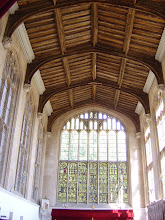
I am not normally an aficionado of natural history programmes on the moving television screen; if one wants wildlife, one only has to spend one's life in the Church of England and for nature red in tooth and claw, an English Cathedral. No matter. I am not, in point of fact, normally a viewer of very much the telly has to offer (largely because it has so little). But one can't paper walls forever, one has to wait for paint to dry and in so doing this week I have become rather taken by this programme. This has been helped, no doubt, by watching it in conditions not unlike those endured by the presenters seated by their braziers or else being buffeted by North Sea gales. All the windows of my flat have been wide open (decorating fumes are terribly bad for singing) and thus, the heating has been turned off (I'm not paying to heat the Precentor's patio!) and the lights, too, as a money-saving measure. More of that anon. But I cannot let this week's revelations pass without drawing to your attention the small matter of the deer rut. For the programme has proved beyond reasonable doubt that success in, ahem, the small matter of what gentleman and women (or gentle deers and does) get up to in the privacy of their conjugal terrain (that is, when not under the intrusive gaze of Simon King!) is due not to the size of antler (or the size of whatever the equivalent in human terms might be) or strength and fearsomeness in battle, not even on physical appearance or prowess. No. Success 'with the ladies' is attributed to none of this. At least not among the fallow deer. No. What lady deers admire, what makes them prick up their furry little ears, what turns their delicate heads and positively gets them queueing up for the attentions of a stag is... the man's voice. Yes. The sound he makes. And the deeper, the better. Personally, I've always found it rather strange that opera composers cast the male lead as a tenor, a fact no doubt attributable to the fact that so many of them must be homosexual. Now we know, thanks to the BBC, that deeper is definitely better. And I shall now lose no time in apprising dear Felicia of the fact. In person. Toodle-pip!













